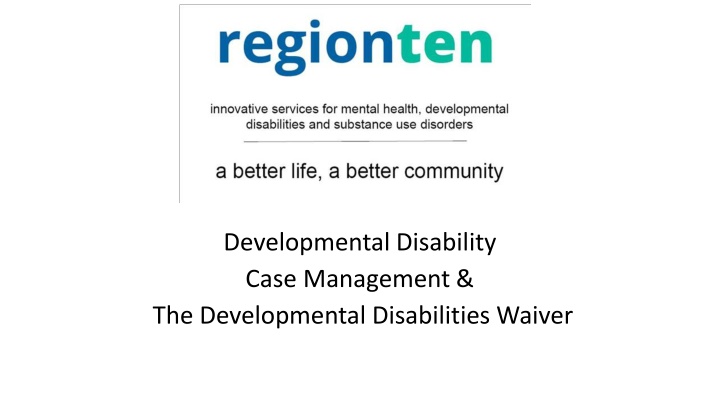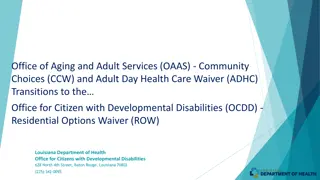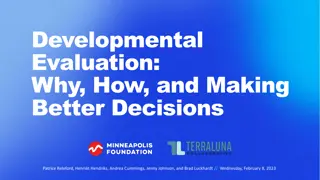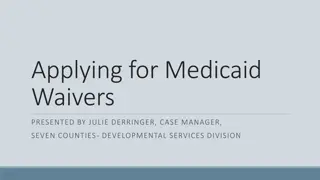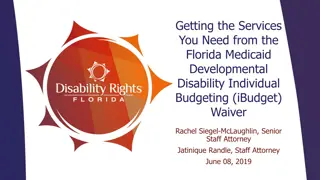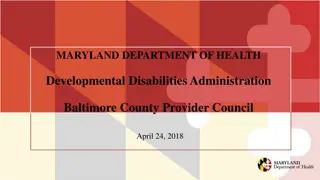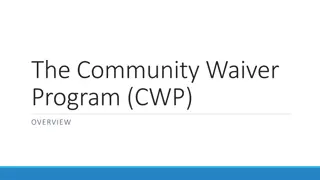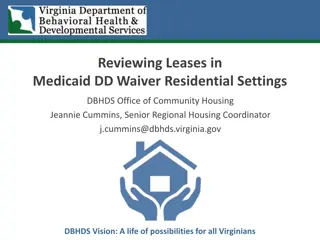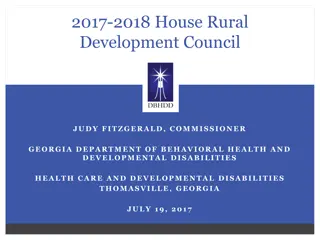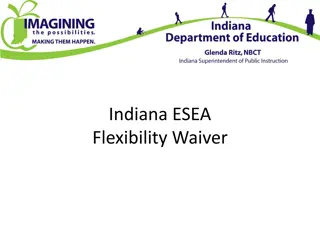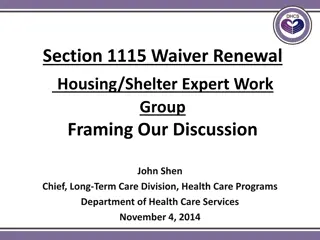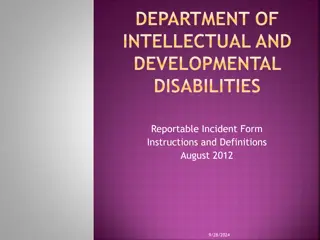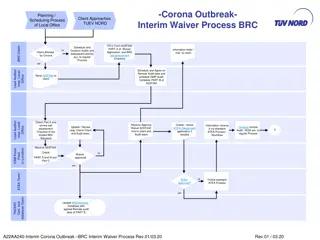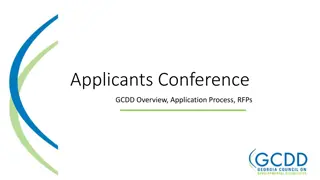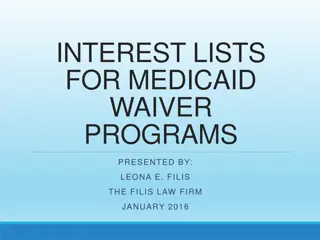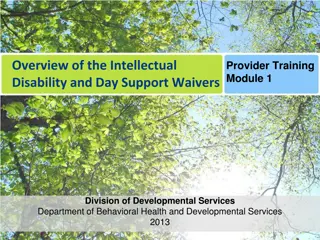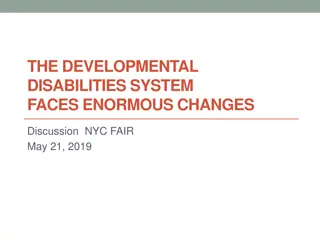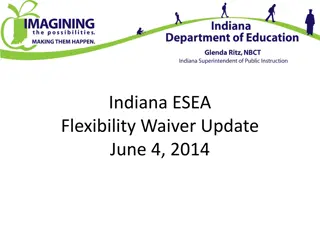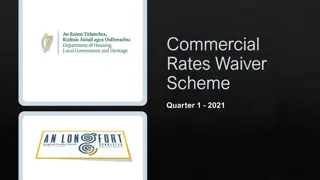Developmental Disabilities Case Management & DD Waiver Overview
Community Service Boards (CSBs) in Virginia serve as the entry points for publicly funded mental health, substance use disorder, and developmental services. The DD Waiver is a Medicaid-funded program that promotes independent living skills and community inclusion, allowing individuals to receive services in their homes instead of institutions. Eligibility criteria include diagnostic and functional assessments, with waivers covering various supports like medical care and employment assistance.
Download Presentation

Please find below an Image/Link to download the presentation.
The content on the website is provided AS IS for your information and personal use only. It may not be sold, licensed, or shared on other websites without obtaining consent from the author.If you encounter any issues during the download, it is possible that the publisher has removed the file from their server.
You are allowed to download the files provided on this website for personal or commercial use, subject to the condition that they are used lawfully. All files are the property of their respective owners.
The content on the website is provided AS IS for your information and personal use only. It may not be sold, licensed, or shared on other websites without obtaining consent from the author.
E N D
Presentation Transcript
Developmental Disability Case Management & The Developmental Disabilities Waiver
About CSBs Community Service Boards (CSBs) are by statute the single points of entry into publicly funded mental health, substance use disorder, and developmental services. Virginia currently has 40 CSBs. Requirements to qualify for the DD waiver are the same at every CSB (state-wide requirements).
What is a DD Waiver? A Medicaid funded program that supports individuals to increase their independent living skills and promotes community inclusion. A waiver is how you actually receive services and supports. Waivers cover a variety of items including: Services that provide medical care Supports for employment Supports for community living Behavioral supports Other items like medical goods and assistive technology that help people avoid living in a hospital, nursing home, or other institution.
Whats being waived? By accepting a DD waiver, individuals waive their right to institutional care in favor of community based services. When you accept a waiver you are choosing to have people support you in your home and community instead of a nursing home or other institution.
Who is eligible? Diagnostic Eligibility Individuals who have been diagnosed with an intellectual disability prior to the age of 18. A psychological evaluation signed by a licensed professional is required prior to screening appointment. Individuals who have been diagnosed with a developmental disability prior to the age of 22. An evaluation signed by a licensed professional is required prior to screening appointment. Children under the age of 7 who have a developmental delay and are at risk of being diagnosed with a developmental disability. An evaluation signed by a licensed professional is required prior to screening appointment.
Who is eligible? Functional Eligibility The individual needs the same level of support as someone who is living in an intermediate care facility for people with developmental disabilities (ICFDD). The VIDES- Virginia Individual Developmental Disabilities Eligibility Survey. Completed at the screening appointment Reviews 8 life areas- health, communication, task learning, personal care, motor skills, behavior, community living skills and self direction Different versions of the VIDES for different age groups Completed Initially and then annually once a waiver slot is awarded
Who is eligible? Medicaid Financial Eligibility When offered a funding slot the individual must be Medicaid-eligible. If individual does not already have active Medicaid coverage, the individual must apply for Medicaid. Your local Department of Social Services determines if an individual is eligible for Medicaid. Many questions or issues can only be resolved through your local department of social services agency. To find your local department of social services: https://www.dss.virginia.gov/localagency/index.cgi The individual must be willing to accept services within 30 days of being offered a funding slot.
Important things to know about the process Getting on the waitlist is important! Being counted and planning at the state level DBHDS Individual and Family Support (IFSP) Grant eligibility http://dbhds.virginia.gov/developmental-services/ifsp Not everyone who requests a waiver will be found eligible. Everyone found eligible is added to a waitlist and their priority on the waitlist is determined. A committee decides who receives the waiver based on the need of the individual for the services. Funding slots: start of the fiscal year (July-Sept), or when a previously used slot is reissued It can take years to get a DD Waiver funding slot.
Priority Status: One, Two or Three? Everyone who meets eligibility (diagnostic, functional and financial) is be added to the DD Waiver Statewide Waiting List. Everyone on the Waiting List receives a Priority Status initially assigned by an individual at the CSB who is responsible for completing intakes, determining eligibility and adding individuals to the waiver wait list. Criteria for making priority determination is established by the Department of Behavioral Health and Developmental Services (DBHDS). The priority screening should be reviewed anytime there is a change in circumstance to assure it accurately reflects the support needs of the individual on the waiver wait list. The Priority Status is based on how much and how quickly someone is in need of help. Contact your Case Manager (also known as a Support Coordinator) to make them aware of changes in your contact information and support needs. DBHDS will mail or email an annual recertification to remain on the DD waiver waitlist. Be sure to respond to avoid being removed from the waitlist!
Funding Slots: BI, FIS, CL Each person who receives a waiver slot will be offered one of three waiver funding slots depending on the kind of support they need and what funding slots the CSB has available to allocate. Each funding slot has a menu of services. There are three funding slots types (All are DD Waivers) BI or Building Independence funding slot FIS or Family and Individual Support funding slot CL or Community Living funding slot
What is Case Management? Targeted Support Coordination (Case Management) services are defined as services furnished to assist individuals, eligible Mediciad, in gaining access to needed medical, social, educational and other services. There are two kinds of support coordination, one for people with ID and one for all others who have DD but not an ID diagnosis. They have different rates and different qualifications depending on the type of case management and whether or not an individual has the DD waiver.
Housing Must qualify or be on the DD waiver waitlist This is a several month process. Natural support involved is required, if natural support is not available CM will support. CM will have to assess housing readiness and natural supports schedule.
Developmental Disability (DD) Case Management You can request screening for DD Case Management and the DD waiver by calling your local Community Services Board (CSB). Region Ten CSB: City of Charlottesville, Albemarle, Fluvanna, Greene, Nelson and Louisa. Savannah Thompson, Senior Case Manager, (434) 972-1722, Savannah.Thompson@regionten.org, for Charlottesville/Albemarle residents Call Christina Ritenour, (434) 589-8276, Christina.Ritenour@regionten.org, for Fluvanna, Greene, Nelson and Louisa residents DD Case Managers (DDCM) monitor, link and coordinate services to meet the individuals needs and to support them to be successful living in the community.
Types of Case Management Active Monthly Case Management On the DD waiver waitlist and have an active need for ongoing support. Has the DD waiver Requires participation to develop a Person- Centered Individual Support Plan. Requires monthly contact with the case manager to include at least one face-to-face contact every 90-days. For individuals with high medical or behavioral support needs monthly visits are required. Level II As-Needed Case Management On the DD waiver waitlist or an ID individual who does not qualify for the DD waiver waitlist. Individual or family must contact Case Manager with updates regarding any changes in status or new needs. Does not require monthly contacts or 90- day face to face visits. Case Management supports are provided on an as-needed basis. Individuals may be referred to active case management depending upon assessed needs.
Interacting with Case Management Initially, the Case Manager will gather information such as historical information about your family member, past services used and how effective they were, public benefits currently being received (such as Medicaid, Social Security & others), and your family member s hopes, dreams and vision of a good life. Engagement is a key component in order to receive effective Support Coordination services. It significantly increases the likelihood that someone will: Access needed services Remain connected to services Actively participate in services Achieve their outcomes
What to do while on the DD Waiver Waitlist Update Case Manager regarding any changes in status at least annually If on Level II status, contacts are as follows: Charlottesville/Albemarle: Amy Berry or Zara Strickler (amy.berry@regionten.org or zara.strickler@regionten.org) Fluvanna, Louisa, Greene or Nelson: Jackie Fanning (Jacqueline.fanning@regionten.org) Apply for CCC+ waiver with DSS Apply for Medicaid with DSS If ID diagnosis, ask for new psychological around age 14-16 Respond to DBHDS forms
